March 21, 2008
Air Date: March 21, 2008
FULL SHOW
SEGMENTS
Sacramento Salmon Crash
View the page for this story
The Chinook salmon that spawn in the Sacramento River make up 90 percent of the wild salmon caught off the coast of California. But last year just a third of the salmon population returned to the river to spawn. Host Bruce Gellerman talks with Zeke Grader, executive director of the Pacific Coast Federation of Fisherman’s Association, to find out what happened. (04:00)
Court’s Climate Ruling Puts Heat on EPA
/ Jeff YoungView the page for this story
It's been almost a year since the Supreme Court's landmark ruling on global warming. But the Bush administration has still not taken the first step toward promised regulations on greenhouse gases coming from cars and trucks. Living on Earth's Jeff Young looks into whether the White House will act, or just run out the clock. (07:15)
Burning Controversy
/ Bruce GellermanView the page for this story
With the price of oil soaring, an increasing number of homeowners are installing outdoor wood boilers to heat their homes. In Maine, where wood is plentiful, and burning wood is a tradition, smoke from the devices ignited a firestorm of controversy, pitting neighbor against neighbor. Living on Earth host Bruce Gellerman investigates the case for and against outdoor wood boilers. (17:00)
Emerging Science Note/Topi Love
/ Alexandra GutierrezView the page for this story
Living on Earth’s Alexandra Gutierrez reports that female topi antelopes defy typical animal behavior patterns and aggressively pursue their male mates. (01:30)
UN World Water Day
View the page for this story
March 22nd is Water Day, designated by the United Nations as a time to call attention to water woes around the world. Host Bruce Gellerman talks with Paul Faeth, executive director of Global Water Challenge, about some of the work non-profits are doing to bring water to communities in the developing world. (04:00)
Wealth and Health
View the page for this story
When it comes to your personal health, diet and exercise are great but your salary and zip code could be bigger factors in how long you will live. That’s the message behind the new PBS series “Unnatural Causes, Is Inequality Making us Sick?” Host Bruce Gellerman speaks with Llewellyn Smith, co-executive producer of the series. (07:45)
Journey Beyond
View the page for this story
Arthur C. Clarke was best known as the author of “2001: A Space Odyssey” but he was also somewhat of a prophet. He foresaw the development of telecommunications satellites in 1945 and dreamt of an elevator to space that some say may be in our future. Sir Arthur C. Clarke died at the age of 90, or, as he would have said, on his ninetieth orbit of the sun. Living on Earth pays tribute. (01:45)
Show Credits and Funders
Show Transcript
HOST: Bruce Gellerman
REPORTERS: Bruce Gellerman, Jeff Young
GUESTS: Paul Faeth, Zeke Grader, Llewellyn Smith
[THEME]
GELLERMAN: From Public Radio International – this is Living on Earth.
[THEME]
GELLERMAN: I’m Bruce Gellerman. The heat is on for outdoor wood burning boilers. In Maine they’ve ignited a firestorm of controversy.
BETH THOMAS: I mean I grew up in Maine. We're wood burning people. This is what I was trying to tell neighbors, and it just, it fell on deaf ears. I'm all for emissions control. You know, what comes out of that stack needs to be filtered.
GELLERMAN: Going up in smoke – neighborly relations over a natural cost-effective way to heat a home. Also, the one that got away, a fish called King.
ZEKE GRADER: If you look at our salmon species as a General Motors, king salmon’s really the Cadillac of the salmon species.
GELLERMAN: And just as threatened, as king salmon is under siege on the Pacific coast, and scientists aren’t sure why. These stories and more this week on Living on Earth. Stick around!
[MUSIC: Boards Of Canada “Zoetrope” from “In A Beautiful Place Out In The Country” (Warp Records 2000)]
ANNOUNCER: Support for Living on Earth comes from the National Science Foundation and Stonyfield Farm.
Sacramento Salmon Crash
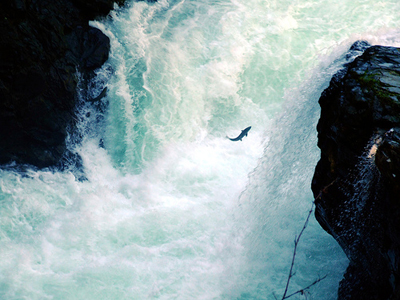
Chinook salmon defying waterfalls in the Stamp River near Port Alberni, Canada. (Photo: alaskapine)
[THEME]
GELLERMAN: From the Jennifer and Ted Stanley Studios in Somerville, Massachusetts – this is Living on Earth. I’m Bruce Gellerman, in for Steve Curwood.
[SOUND OF PIKE PLACE MARKET]
GELLERMAN: At the famous Pike Place Market, in Seattle, you can get fish in all shapes, colors, sizes and stripes.
[SFX FROM PIKE PLACE MARKET]
GELLERMAN: There’s one fish, two fish, red fish, blue fish – if you count the blue crabs. And ruling over all is the deep orange King Salmon, so-called Chinook. But this year, Chinook from California’s Sacramento River are going to be scarce. They’re mysteriously disappearing. Just a fraction of the adult salmon returned to spawn in the Sacramento River. And it’s not just the adults – at one hatchery, just four of 200 young fish released survived the 335 mile journey to the Golden Gate Bridge.

Pike Place, the famous bustling fish market in Seattle, won’t be tossing customers many California Chinook salmon this year.
(Photo: Bruce Gellerman)
GRADER: Thank you for having me!
GELLERMAN: What do you think is devastating the Chinook salmon fishery?
GRADER: Well, it’s a combination of factors. We did have a decline in productivity in the ocean in 2005, 2006 , but I think a bigger impact has been the excessive water exports from the Sacramento-San Joaquin Delta system, where 90 percent of the salmon that are harvested offshore California migrate through and use as nursery habitat.
GELLERMAN: So if a ban is put in place, fisherman won’t be able to catch salmon from northern Oregon to the Mexican border?
GRADER: Well certainly we’re expecting to see a ban or a near closure off of both Oregon and California, and Washington will certainly be restricted.
GELLERMAN: Well how are the fisherman that you represent responding to this idea?
GRADER: Well, they’re not happy with it, obviously, but I think the numbers are there and they’re not really disputing the numbers. They’re really looking at this from the standpoint of figuring out how they’re gonna be able to survive this year and perhaps next year with no fishing, and second, I think, looking at what can be done now to affect some changes in the way we manage the salmon’s habitat and the water flows that affect them in such a way that we’re not going to be looking at these similar situations again.
GELLERMAN: So how much money are we talking here if they have to shut down the fishery on May first?
GRADER: Well the figures vary widely. I’ve heard figures from the recreational fishery of billions of dollars. I don’t know – it depends how we calculate it. I think certainly one of the more conservative figures came from the New York Times at $150 million – I suspect that’s probably about right.
GELLERMAN: What is this going to mean for, well, for me, for a person who loves eating salmon?
GRADER: Well, for most of the country it won’t make that big a difference because most of their wild salmon will be coming out of Alaska, and Alaska is expecting to have a fairly good season again this year, and that’s certainly what we’d encourage people to do.
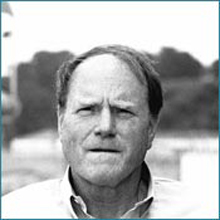
Zeke Grader is executive director of the Institute for Fisheries Resources. Grader calls the dwindling Chinook the “Cadillac” of salmon species. (Photo: Institute for Fisheries Research)
GELLERMAN: You sound optimistic. We’ve seen this salmon fishery crash before, and it’s made a comeback. So you think it’s gonna come back again?
GRADER: Well, it can come back and it should come back, I think if we do the right things, and I think the critical thing now is going to be fixing the Bay and Delta, and that means basically curtailing any further water exports from that system, reducing them, and for California it means doing something that we should have been doing 30 years ago, which is decentralizing our water supplies and diversifying them
GELLERMAN: Mr. Grader, thank you very much.
GRADER: Thank you.
GELLERMAN: Zeke Grader is the executive director of the Pacific Coast Federation of Fishermen’s Association.
Related links:
- Institute for Fisheries Research
- Pacific Fisheries Management Council
[MUSIC: Sharon Jones & The DAP Kings “Fish In The Dish” from Naturally]
Court’s Climate Ruling Puts Heat on EPA
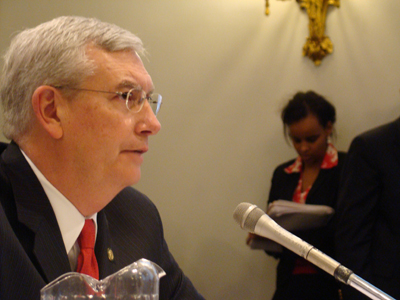
EPA Administrator Stephen Johnson on the hot seat over his agency’s slow response the court’s climate decision.(Photo: Select Committee on Energy Independence and Global Warming)
GELLERMAN: April second will mark one year since a landmark Supreme Court decision on global warming. In the case Massachusetts versus EPA, the court told the Environmental Protection Agency that the greenhouse gas carbon dioxide is a pollutant that can be regulated under the Clean Air Act. But nearly a year later the Bush administration has done little to respond. Living on Earth’s Jeff Young reports some critics are charging the White House is deliberately running out the clock on the court’s climate ruling.
YOUNG: Each time EPA administrator Stephen Johnson testifies before congress on climate change—and that’s a lot lately—he stresses his belief that global warming is real.
JOHNSON: Let me begin by saying that I agree that climate change is a global challenge.
YOUNG: Johnson might feel a bit of warming just beneath him—he’s definitely in the hot seat.
INSLEE: You’re the fireman, and the planet’s on fire and you don’t pick up a hose, you don’t pick up a water bucket, you do nothing. Your administration has done nothing about this before the Supreme Court decision or after the Supreme Court decision.
YOUNG: What has critics like Washington Democratic Representative Jay Inslee so upset is Johnson’s response to last year’s Supreme Court case, Massachusetts v. EPA. In their 5-4 decision, the justices rejected Johnson’s argument that he lacks authority to regulate carbon dioxide. That was last April. Since then the Bush administration has missed its self-imposed deadlines to respond to the ruling. And a regulation on CO2 now seems unlikely before the end of the president’s term.
Last May, President Bush told the EPA to write a regulation to control greenhouse gases from cars and trucks.
BUSH: This is a complicated legal and technical matter, and it's gonna take time to fully resolve. Yet it is important to move forward, so I have directed members of my administration to complete the process by the end of 2008.
YOUNG: In a press briefing last June, Johnson said he would publish a draft rule for reducing greenhouse gases within six months.

The U.S. Supreme Court (Photo: U.S. Supreme Court)
YOUNG: 2007 ended with no proposed regulation. This month, Johnson told Congress he could not even predict when he would make the first decision along that regulatory path, what’s called an endangerment ruling. The Clean Air Act instructs the EPA administrator to say whether a pollutant might reasonably endanger public health or welfare. Johnson says he needs to think about it.
JOHNSON: Because a decision on one part of the Clean Air Act could have lasting consequences and unforeseen economic consequences. So that means any facility that would emit any CO2 would then trigger all the regulatory framework of the clean air act.
YOUNG: Johnson also says Congress’s recent decision to increase auto fuel efficiency requires his agency to revisit its approach to regulating tailpipe emissions. His argument closely mirrors that made by the conservative think tank, the Heritage Foundation. Heritage energy analyst Ben Lieberman says EPA is wise to avoid what he calls a regulatory Pandora’s box.
LIEBERMAN: Once it’s established under the Clean Air Act that these emissions are pollutants that endanger public health, then they would probably have to be regulated from a number of other sources – small businesses, even farms in a way that heretofore were only done to very large industrial facilities.
YOUNG: So your message is getting through?
LIEBERMAN: I would hope so. I don’t know where it came from, but it would seem the pitfalls of regulating CO2 in this way have been reflected by the administrator in his recent testimony.
YOUNG: Attorneys who sued the EPA say that’s not the way it’s supposed to work. Georgetown Law professor Lisa Heinzerling wrote the legal briefs that won in the Supreme Court. She says the court called for Johnson to make his decision about greenhouse gases based on the law and the science.
HEINZERLING: It’s not about the policies they might be afraid of, it’s not about their preferred approach to regulation, it’s not about liking the Clean Air Act, it’s about the science. And that was what we fought in Massachusetts v EPA—so I was really shocked to hear Mr. Johnson use exactly the same kind of reasoning to justify what he is not doing now.
YOUNG: Heinzerling says another decision by Johnson late last year shows he does recognize the dangers from greenhouse gases. Ironically, when Johnson denied California permission to regulate CO2 from tailpipes, he did so by pointing out that the entire country could suffer things like drought, wildfires and sea level rise.
HEINZERLING: What they said is rather odd, but what they said is climate change is going to be so bad everywhere that California isn’t different enough to justify its own program. Now, of course, EPA says no, that wasn’t an endangerment finding formally, that was just our decision here. But it would be like saying, oh the world is round but in the next decision saying no, sorry, in this context it’s flat.
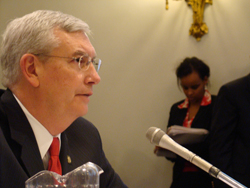
EPA Administrator Stephen Johnson on the hot seat over his agency’s slow response the court’s climate decision. (Photo: Select Committee on Energy Independence and Global Warming)
WAXMAN: In early December he sent his endangerment finding to the White House, and they’ve been sitting on it every since.
YOUNG: Waxman hopes his committee’s investigation will spur EPA to act. But with less than a year left in the Bush administration, it seems unlikely they will have time for the public hearings and the other work that goes into crafting a regulation.
WAXMAN: We might as a practical matter have to wait this administration out. But the EPA director is obligated under the law to act on his own judgment and Steve Johnson is gonna have to come to the conclusion what his judgment really is, what he sent to the White House as his judgment or what the White House tells him his judgment should be.
GELLERMAN: California Congressman Henry Waxman. Jeff, one quick question, before you go.
YOUNG: Okay.
GELLERMAN: This landmark decision, has it achieved anything?
YOUNG: Well, you know, I asked that of the people who brought the suit and won it, and clearly they are frustrated that despite winning in the high court, they don’t have a whole lot to show for it just yet. But they do point to other indirect effects that the ruling is having. Kansas, for example, is one of the states fighting against proposed new coal-fired power plants. And Kansas’ governor has cited this Supreme Court’s decision and all of the uncertainty that it brings about how to deal with CO2 emissions, as one of the reasons to deny permits for coal-fired power. So it’s had a legal impact, but it’s too soon to say when or even if that’s going to translate into any real reductions in greenhouse gases.
GELLERMAN: Ah, the wheels of justice do grind slowly, Jeff.
YOUNG: Indeed.
GELLERMAN: Thanks. Jeff Young is Living on Earth’s Washington correspondent.
Related links:
- Read testimony from Stephen Johnson and Lisa Heinzerling in the House’s global warming committee
- Georgetown Law’s overview of global warming in the courts
- To read previous Living on Earth coverage of the high court’s climate case, click here . . .
- and here!
[MUSIC: Michael Borstlap/Bill Bruford “Conference Of The Bees” from In Two Minds (Summerfold Records 2007)]
GELLERMAN: Coming up…outdoor wood boilers. A burning issue sets neighbor against neighbor. Keep listening to Living on Earth.
[MUSIC: Out To Lunch “When You Hear Music” from Excuse Me While I Do The Boogaloo (Accurate Records 2008)]
Burning Controversy
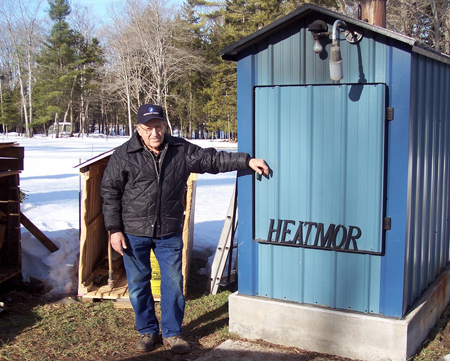
Roland Morin stands by the outdoor wood boiler he and his wife use to heat their home. They decided to trade their oil furnace for an outdoor wood boiler after the textile mill in town shut down and Roland lost his job. (Photo: Bruce Gellerman)
GELLERMAN: It’s Living on Earth. I’m Bruce Gellerman
[MUSIC: PAUL BUNYAN by Kit and Kaboodle from their album “Ready for Fun”.]
GELLERMAN: The state of Maine claims to be the birthplace of America’s timber industry and fabled lumberjack Paul Bunyan.
[MUSIC: PAUL BUNYAN by Kit and Kaboodle from their album “Ready for Fun”.]
GELLERMAN: In Bangor you’ll find what’s maybe the world’s largest statue of the mythic woodsman. In Maine, it’s not just a tall tale. 90 percent of the Pine Tree State is forested. It’s the highest percentage in the nation. The state seal and flag both feature a White Pine. The roots of forestry run deep in the hearts and minds of Mainers.
DURGIN-LEIGHTON: It’s tradition…it’s part of our culture.
GELLERMAN: Kathy Durgin-Leighton is town manager of Bowdoinham, Maine.
DURGIN-LEIGHTON: Wood is a natural resource here. We have plenty of it. People make their living logging. It’s just a way of life here. I think if you went down any country road you’d see a wood pile.
[SFX DOOR OPEN….and closing…]
GELLERMAN: There are half a dozen wood piles behind Roland and Dorina Morin’s home in Brunswick Maine.
[WALKING ON SNOW]
GELLERMAN: The Morins have 75 acres of trees. Roland built their home with lumber from the trees. Out back, along the fence line, are neatly stacked cords of dry-split wood – mostly pine and a little hardwood.
GELLERMAN: So what a nice day!
ROLAND MORIN: Yup, beautiful day.
[WALKING ON SNOW]
GELLERMAN: It’s mid winter—the air is crisp, the sky blue, and the white pines soar in the Morin’s back yard. It’s quintessential New England.
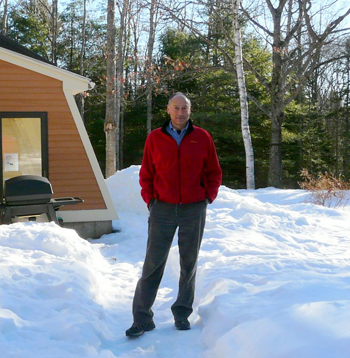
Jeff Welt says fumes from his neighbors’ outdoor wood boiler give him headaches and nausea. (Photo: Bruce Gellerman)
GELLERMAN: Outside it’s an unseasonably warm 45 degrees. Inside the Morin home it’s a toasty 75 – thanks to the outdoor wood boiler Roland installed about 50 feet behind their house. It’s in a metal shed with a 12-foot high smokestack poking out of the top. The wood boiler looks a little like an outhouse.
ROLAND MORIN: You want to see the inside there?
GELLERMAN: Sure.
ROLAND MORIN: Just stand back a little bit – you might have smoke coming out at you.
[DOOR BANGING SHUT]
GELLERMAN: Outdoor wood boilers are relatively new devices. They’ve been around about a dozen years. Roland Morin’s wood boiler fire box is surrounded by a metal water-jacket. The burning wood heats the water, which is piped underground into his home.
GELLERMAN ON TAPE: And this fire, this little firebox, here, heats your entire house?
ROLAND MORIN: Oh yes. It could heat two or three that size. It doesn't take that much heat to heat the house.
[BANG OF DOOR OPENING]
GELLERMAN: So on a day like this, would you be burning much wood?
ROLAND MORIN: No, no, especially as warm as it is, hardly at all.
[STEEL DOOR CLOSING]
GELLERMAN: In the 1960’s, the Morins were paying 13 cents a gallon for fuel oil. But a few years ago, after the textile mill in town shut down, and Roland lost his job, he and Dorina decided to replace their old oil furnace with an outdoor wood boiler.
DORINA MORIN: We like it very, very much.
GELLERMAN: Dorina Morin says they like their wood boiler so much, two of their sons, who live just down the road, also bought them.
DORINA MORIN: It’s all outside and the heat is very steady. We don’t worry about any heat. And it also heats our hot water
GELLERMAN: Because the boiler is outdoors, there’s no wood mess inside the Morin’s house. And Roland has made a few special modifications to the wood boiler – so it burns clean.
[BANGING OF WOOD BOILER]
ROLAND MORIN: When it's idling properly there's almost no smoke whatsoever.
GELLERMAN: Roland Morin’s sense of humor is as dry as the logs he throws into his wood boiler. The sign over his tool shop reads, ‘Smokey Hollow,’ because as he’s learned, where there’s a smoke from an outdoor wood boiler – often there’s a burning controversy.

Beth Thomas moved from a town that refused to ban outdoor wood boilers. (Photo: Bruce Gellerman)
[METAL CLANK]
GELLERMAN: Yeah, so do you deserve that reputation?
ROLAND MORIN: Oh yeah. [LAUGHS.] No. No, I don't deserve it.
WELT: It was choking, pungent, acrid odors.
GELLERMAN: Jeff Welt lives 500 feet down the road and downwind from the Morin home and their outdoor wood boiler:
WELT: We were smelling pretty heavy fumes, I mean it would wake us up at night and we'd have headaches and nausea. So we can't keep our windows open. We do a lot of things traditionally, like hang our clothes out to dry – we don't like to use a dryer – stopped doing that. We have a big garden out back here, and we were really concerned last year about whether we should be eating food out of the garden.
DORINA MORIN: We never smell the smoke. And I can even open our bedroom window, which is not far from the wood boiler.
GELLERMAN: Dorina Morin doesn’t understand her neighbor Jeff Welt’s problem.
DORINA MORIN: And, I also in the spring and the fall, I hang out my clothes. And I take them in. They don't smell like smoke.
GELLERMAN: Good fences may make good neighbors but when it comes to wood smoke from outdoor boilers, Jeff Welt found, fences aren’t much help.
WELT: And then my neighbors started calling, the neighbors who live up and down the street, and they pass here on the way to work or they jog by or something, and they’re saying it's gross.
GELLERMAN: Again, Roland Morin:
ROLAND MORIN: They complain so much, every complaint brings someone else to say that this furnace is bad.
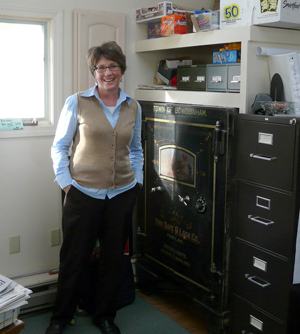
Bowdinham town manager Kathy Durgin-Leighton said talk of regulating outdoor wood boilers divided the community. “I think it was a statement of their rights to burn wood,” she said. (Photo: Bruce Gellerman)
WELT: People are not allowed to dump poison waste on my property. They're not allowed to poison the water that we drink. But meanwhile they're contaminating, poisoning the air that we breathe. That shouldn't be allowed.
GELLERMAN: But in most places wood boilers are allowed – and their number is growing dramatically nationwide.
RECTOR: We saw an exponential growth as oil prices began to rise.
GELLERMAN: Lisa Rector is a senior policy analyst with NESCAUM, the Northeast States for Coordinated Air Use Management, which represents air quality agencies in six states. Just three years ago, Rector says, there were about 150 thousand outdoor wood boilers in the US. Today there are a quarter of a million and she predicts the number will soon double.
RECTOR: We estimated that, left unchecked, and sales trends continue there would be half a million in place in 2010.
GELLERMAN: The reason wood boilers are so popular these days is simple.
DOUG THOMAS: Let's look at the big picture. Ok?
GELLERMAN: It’s money, says Maine representative Doug Thomas. His district is one of the poorest in the state, and wood boilers are popular there.
DOUG THOMAS: A lot of people need to replace foreign oil. They cannot afford to buy oil to heat their homes. Eighty percent of the homes in Maine are heated by oil and $3.29 a gallon on the incomes that we have here, with the cold winters that we have, people can't afford it. They have got to find alternatives.
GELLERMAN: And in Maine, the natural alternative to skyrocketing oil prices is wood. Wood is plentiful. It’s renewable – and if you replace downed trees with new ones, it’s carbon neutral.
But burning wood can also be deadly.
RECTOR: A lot of people think of wood smoke as that smell of Christmas. But actually wood smoke is a fairly toxic substance.
GELLERMAN: Lisa Rector of NESCAUM says wood boilers are by far, the dirtiest way to heat a home.
RECTOR: One outdoor wood boiler, the emissions, the PM emissions, the particulate matter emissions from these units is equivalent to 205 oil furnaces and three to eight thousand natural gas fired stations, or 50 idling diesel trucks. So it’s like having a truck stop in your backyard.
GELLERMAN: Rector says particularly troubling are the fine microscopic particles in smoke, specks so small they can lodge deep in your lungs.
RECTOR: Those particles, even if your doors are closed, your windows are closed, they’ll still find their way into your house. Those particles cause cardio-pulminary issues, asthma. They can be especially be of risk to sensitive populations such as children, the elderly, those with asthma. So wood smoke is not a benign substance. It’s one of the largest sources of fine particles in north America today.
GELLERMAN: Fine particulates in the air kill 60 thousand Americans a year – more than die in auto accidents. And besides fine particulates there are other toxic pollutants in wood smoke and creosote which builds up in smoke stakes – volatile organic compounds, polyaromatic hydrocarbons and dioxins, some known carcinogens.
GELLERMAN: Armed with this information, Jeff Welt in Brunswick, Maine, who lives near a wood boiler, decided to take action.
WELT: Twenty of my neighbors signed a petition that we sent to the state, saying it's adversely affecting the enjoyment of the neighborhood. You know – do something about it.
GELLERMAN: But there was nothing the State of Maine could do. Back in 2006 when Welt complained to state officials, there were no laws regulating outdoor wood boilers – not federal, state, or local. Wood boilers pit neighbor against neighbor and town against town. As the number of wood boilers increased, so did complaints. Lisa Rector of NESCAUM fielded many of them.
RECTOR: In many cases, and I’ve heard of them personally, people have called me looking for help. They’ve gone to their local town officials, their state officials, and there really is no regulatory avenue to address these.
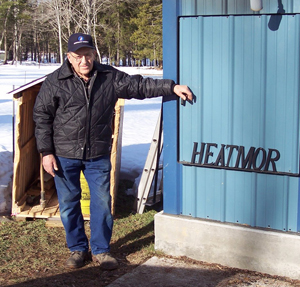
Roland Morin stands by the outdoor wood boiler he and his wife use to heat their home. They decided to trade their oil furnace for an outdoor wood boiler after the textile mill in town shut down and Roland lost his job. (Photo: Bruce Gellerman)
RECTOR: So they are required to either live with the situation, move, or bring a lawsuit and try to address it through private party nuisance law suits.
BETH THOMAS: And I said I’m not going to sue my neighbor. I’m not going to do that.
GELLERMAN: In fact, Beth Thomas of Bowdinham, Maine, wound up doing precisely that. She sued her neighbor over an outdoor wood boiler. Thomas, her husband and 2 small kids lived on the outskirts of town. It’s just north of Brunswick, which had restricted wood boilers – but Bowdinham still allowed them. The Thomas family lived downwind from a commercial laundry that used an outdoor wood boiler 24/7.
BETH THOMAS: I would be out in garden getting these headaches, intense headaches, and it would get hard to breathe. And if it were really bad, and the creosote-based smoke was coming into the house itself, which happens frequently, I would just put the kids in the car and go.
GELLERMAN: So, what did you do?
BETH THOMAS: What did I do. I called everybody I could find that I knew who might have some control or some information about this, and uh, from the Air Toxics to the Air Bureau to the – everybody – and the only thing people could say was, there's a nuisance law – you can sue them. Or you can move – that was the other thing. You can move.
GELLERMAN: Thomas’s lawsuit went nowhere. So she tried to get Bowdinham to regulate the boilers. At town meeting, the debate was intense. Town Manager Kathy Durgin-Leighton says it was about the most controversial issue in Bowdinham history.
DURGIN-LEIGHTON: It really divided people. It became quite a divisive issue. It was clear that the citizens of this town did not want to enact an ordinance that would limit or prohibit the use of outdoor wood boilers.
GELLERMAN: Why is that?
DURGIN-LEIGHTON: I think it was a statement of their rights to burn wood.
BETH THOMAS: We’re not after wood burning rights. That’s silly.
GELLERMAN: Again, Beth Thomas:
BETH THOMAS: I mean I grew up in Maine – we're wood burning people. This is what I was trying to tell neighbors, and it just was – it fell on deaf ears. I'm all for emissions control. What comes out of that stack needs to be filtered.
GELLERMAN: When Bowdinham residents voted to keep wood boilers unregulated, Thomas moved to Hallowell, Maine, a town that banned them. Hallowell is just south of the capitol, Augusta. There, Beth Thomas filed a complaint with officials demanding something be done on the state level to replace the patchwork of local ordinance. State lawmakers were reluctant to take up the issue.
BERRY: I couldn’t believe burning wood could possibly be a health threat.
GELLERMAN: State Representative Seth Berry became an unlikely champion of state limits on outdoor wood boilers – his father has one at his home. But one whiff of a poorly run wood boiler was all Berry needed to change his mind.
BERRY: If you walk through a cloud of creosote smoke, you know it, and your friends know it for a week because you can’t wash it out of your hair.
GELLERMAN: Berry became a man with a mission. His colleagues in the Maine legislature began calling the freshman lawmaker: Boiler Boy. Berry held hearings – angry, contentious meetings that drew huge crowds.
BERRY: These folks were told we were trying to take away their wood boilers and so they were given stickers, bright, fluorescent stickers, saying, ‘Don’t take away my right to burn wood,’ and they lined the halls of the legislature. And by the end of the hearing, once the technical information came out, once the personal stories of folks who lived next to certain problematic boilers came out, many people who had come that day to wear those stickers were taking the stickers off.
GELLERMAN: Berry’s emergency bill – phasing in limits on emissions and where wood boilers can be installed was passed overwhelmingly by Maine’s legislature, and now Maine joins Connecticut and Vermont with laws regulating outdoor wood boilers. Ohio and other states are considering similar measures, and years ago, Washington state banned them all together.
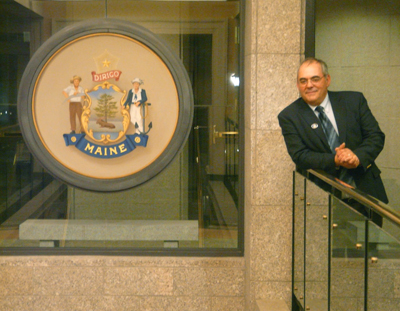
Maine representative Doug Thomas with the state seal, which features the white pine. Thomas says as long as oil prices are high, the popularity of outdoor wood boilers will be high too.(Photo: Bruce Gellerman)
DOUG THOMAS: I really don't want to sell them anymore because, the way these regulations that Maine are writing are, it's going to be complaint-driven enforcement. And so I might sell someone a six or eight thousand dollar wood boiler, and they've got another four or five thousand dollars to install them and they can't use. I don't want to do that to people. I'm not going to do that to people.
GELLERMAN: The federal government has been slow to respond to the wood boiler issue. Twenty years ago the US EPA began regulating indoor wood stoves, setting strict emission standards for them. And, in fact, Beth Thomas, who had to move because she lived near a polluting outdoor wood boiler has one of the new indoor stoves right in the living room of her home.
But she’s in the minority. Despite federal regulations, 90 percent of the estimated ten million indoor wood stoves in the US fail to meet emission requirements. The clean ones just haven’t caught on. That’s why Greg Green, from the EPA’s Office of Air Quality and Standards, hopes to speed things up with boilers. Instead of requiring new cleaner-burning wood boilers, The EPA is setting voluntary guidelines.
GREEN: You know, many times, our regulatory programs, by the time you go through the rule-writing process, and actually implement those rules, you're talking about a four or five year time period. But with the problems that we were seeing with these stoves, uh, with a voluntary program, uh, we realized that we could more than cut that time in half and start seeing emissions reductions, you know, in a one or two-year time period. So that's what we went with.
GELLERMAN: In January the EPA’s new guidelines for outdoor wood boilers went into effect, and manufacturers have started making cleaner burning wood boilers. Rodney Tollefson is vice president of Central Boiler. It’s the nation’s largest manufacturer. He says their new models cut emissions by as much as 90 percent over the old ones.

Roland Morin stands by his Work Shop next to his home in Brunswick, Maine. (Photo: Bruce Gellerman)
GELLERMAN: The new, cleaner burning wood boilers are considerably more expensive, and haven’t been proven in the marketplace or backyards. But Maine state representative Doug Thomas isn’t giving up on wood boilers.
DOUG THOMAS: The technology has its place. It's not for urban areas, it's not for built-up areas, residential areas. It's for rural people who have land, and have access to wood that would otherwise be going to waste, and it's a great alternative source of heat for the right people in the right place.
[MUSIC on player-piano "Rudolph the Red-Nosed Reindeer"]
GELLERMAN: Back in Brunswick, Maine, Roland Morins has finished loading logs into his outdoor wood boiler. It warms the home, where he, Dorina, and their ten kids lived through many a long cold Maine winter.
In the living room Roland relaxes by putting a scroll on their old player piano. It’s a scene of a time gone by, in a place where the white pines still grow incredibly high. But these days, the neighbors live closer than they used to – and yet in many ways, they’re more distant.
Related links:
- EPA Information on Outdoor Wood Boilers
- Northeast States for Coordinated Air Use Management
- Central Boiler, Inc.
GELLERMAN: Our story about outdoor wood boilers was produced with the help of Kathleen O’Neil.
You can hear our program anytime on our website, or get a download for your MP3 player. The address is LOE dot org. That's LOE dot O-R-G. You can reach us at comments @ l-o-e dot org. Once again, comments @ l-o-e dot O-R-G.
Our postal address is 20 Holland Street, Somerville, Massachusetts, 02144. And you can call our listener line, at 800-218-9988. That's 800-218-99-88.
GELLERMAN: Just ahead – remembering one of the sci-fi giants of the 20th century, a writer who predicted much and imagined more, and saw many of his technological dreams become reality . Arthur C. Clarke.
CLARKE: Growing up in the 20s and 30s, I never expected to see so much happen in the span of a few decades.
GELLERMAN: Coming up – Arthur Clarke’s flights of fantasy, fact and fiction. Stay tuned to Living on Earth!
ANNOUNCER: Support for the environmental health desk at Living on Earth comes from the Cedar Tree Foundation. Support also comes from the Richard and Rhoda Goldman fund for coverage of population and the environment. This is Living on Earth on PRI, Public Radio International.
Emerging Science Note/Topi Love

(Photo: U.S. Fish and Wildlife Service)
[MUSIC: James Taylor “Don’t Mess With Mr. T” from Don’t Mess With Mr. T (Dome Records 2007)]
GELLERMAN: It’s Living on Earth. I’m Bruce Gellerman. Coming up, the health dangers of inequality – but first, this note on emerging science from Alexandra Guttierrez.
[THEME]
GUTIERREZ: Female topi antelope don’t like playing hard to get. They’re not into prolonged courtship rituals, and they don’t really like monogamy, either. In the battle of the sexes, these antelope essentially reverse the rules of engagement.
The standard assumption in sexual selection theory is that a male will aggressively pursue a female. But Finnish scientists observed that Topi behavior goes counter to that assumption. Researchers have noticed that female topis persistently – and sometimes violently – attempt to attract the best mate.
Because these females are only fertile for one day, they do not have the luxury of waiting for the best male to choose them, say the scientists. They must instead compete for the attention of the strongest males in order to improve their chances of getting pregnant. The fact that the males’ sperm supply is limited further puts pressure on the females to find one good partner, or sometimes even a few.
While it could be argued that the topi males are in an enviable position, being such an object of desire can be tiring and even dangerous. Males will sometimes collapse from exhaustion as a result of this attention, and they must occasionally fight off females who can be a bit too domineering. So it seems that in the Topi world, love can hurt.
That’s this week’s note on Emerging Science. I’m Alexandra Gutierrez.
[THEME]
UN World Water Day
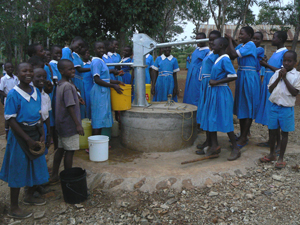
Kenyan schoolchildren gather round a new well at their school. Credit: Global Water Challenge
GELLERMAN: Water, water everywhere…we wish. Today, more than a billion people – one in five – lack a source of safe drinking water. And each day nearly four thousand kids die because of it. Well, March 22nd is World Water Day, something the United Nations ’s been organizing for the past 15 years. And it was three years ago on World Water Day that the UN launched the International Decade for Action: Water for Life – setting ambitious goals to bring safe water to those without.
Paul Faeth is executive director of the Global Water Challenge, a coalition of water and hygiene experts. Mr. Faeth, welcome to Living on Earth!
FAETH: Pleased to be with you today.
GELLERMAN: Mr. Faeth, what specifically are those goals?
FAETH: The goal is to get, for every country in the world, 75 percent of the people with access to safe drinking water.
GELLERMAN: And how well have we done to meet that goal?
FAETH: Well, pretty well, overall – it depends on where you’re at – in Asia for example, in places like India, in 1990, 71 percent of the people had coverage and now it’s 84 percent. But in Africa, it’s 58 percent now, up from 48 percent. So there’s definitely been progress, and since they declared World Water Day in 1992, additional one billion people had gotten access to clean and safe drinking water.
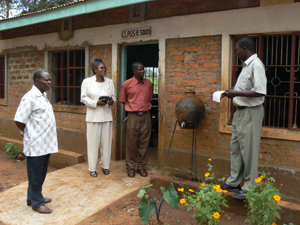
Angeline Allan (center left), a schoolteacher in Kenya, speaks with staff from CARE in front of her school. CARE and other nonprofit organizations are working to increase access to clean water and sanitation in developing countries. (Photo: Global Water Challenge)
FAETH: Yes, we have.
GELLERMAN: We have a clip of tape. I want you to listen to this. It’s from someone your organization worked with there.
FAETH: Angelina Lahn
LAHN: When they are on their monthly periods, they don’t come to school at all, because of the lack of proper sanitation and lack of water, and they just drop out.
GELLERMAN: That’s a big hard to hear – but what she’s saying is that these girls are having their monthly periods and they drop out because of lack of water. What’s the connection?
FAETH: Well, girls like to have privacy and a safe place to use the bathroom when they’re having their periods. So what typically happens is that girls stay home for that one week out of the month. They drop behind in their classes, and after a while they simply drop out of school.
GELLERMAN: So what did your organization, Global Water Challenge, do about Angelina’s school in Kenya?
FAETH: Well, they – GWC in partnership with a number of other groups, such as CARE – developed a well, put in latrines, and brought in a hygiene program for kids to learn how to wash their hands and to keep themselves healthy.
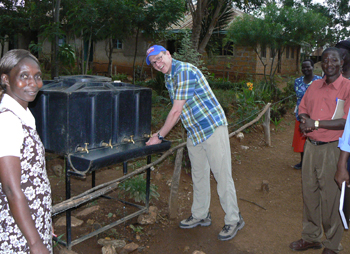
Paul Faeth, executive director of Global Water Challenge, washes his hands at a new faucet at a school in Kenya. (Photo: Global Water Challenge)

Kenyan schoolchildren gather round a new well at their school. (Photo: Global Water Challenge)
FAETH: Well, according to a study that I saw that came out about six months ago, a group of scientists said that in the last 150 years, the greatest medical advance that we have seen is the advancement and application of sanitation. Getting clean water to people is thought to be the easiest way to improve health and economic prosperity in the developing world.
GELLERMAN: Paul Faeth is executive director of the Global Water Challenge. Well, Mr. Faeth, thank you very much.
FAETH: Thank you. I’m glad to be on the show.
GELLERMAN: Happy World Water Day!
FAETH: Thank you! Same to you.
Related link:
Global Water Challenge
[MUSIC: Various Artists “Water No get Enemy” from Red Hot And Riot]
Wealth and Health
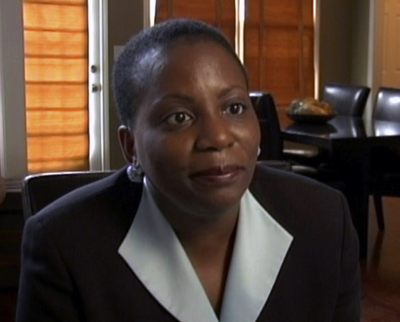
Kim Anderson is a successful Atlanta lawyer who says racism affects her physically.(Photo: Unnatural Causes)
GELLERMAN: They say in real estate, the three most important things are location, location, and location. Well, the same can be said for life expectancy: where you live can determine how long you’ll live. America ranks thirtieth among the nations of the world in life expectancy – on average, we die younger than Jordanians, Slovenians or Portuguese. And if you’re a member of a minority, the situation’s worse – you’re less likely to reach age 65 than someone in Bangladesh.
For the next month, a special PBS-TV series will explore what it is about the American experience that’s so deadly to the poor and minorities. It’s called ‘Unnatural Causes: Is Inequality Making Us Sick?’ The first show, ‘In Sickness and in Wealth,’ examines the hierarchy and health outcomes in a hospital in Louisville, Kentucky. Llewellyn Smith is co-executive producer of the series.
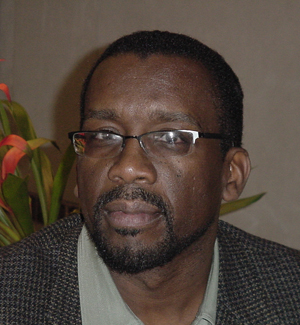
Caption: Llewellyn Smith is co-executive producer of the PBS series “Unnatural Causes: Is Inequality Making us Sick?” (Photo: Annette K. Beecham)
One of the reasons we wanted to do that in the hospital was to just to get people to sort of see the hospital, not as this source for health, but as just any other place. People work in the hospital, there’s a hierarchy in the hospital, which tends to reflect the hierarchy in society. And you’re right – people at the top, the gentleman at the top who is the CEO is in much better health and has much better control over his life than people who are beneath him. And it’s graded, as you said, so people who are in the middle are gonna have better opportunities than people who are the next step below them.
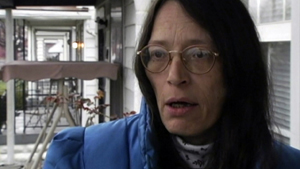
Mary Turner is an unemployed mother who is struggling to cope with poverty and health problems.(Photo: Unnatural Causes)
GELLERMAN: Let’s listen to the CEO:
[MUSIC AND SFX FROM ‘IN SICKNESS AND IN WEALTH’]
CEO: I have a neighborhood where I can be outside and know than I’m safe, and that I can exercise and walk – and I know that not every neighborhood in this country, or in this city, that’s true.
GELLERMAN: So it’s not just about the choices, it seems, that are open to the CEO, but the fact that he has control.
SMITH: That’s right. He has control over his life, he’s in a place where he can make good choices for himself, and for his family. In some years we did interviews with people who are impoverished, including, you know, Mary Turner. She understood what she needed to do to be healthy, and what it was – what was important to safeguard her family’s health. But could she make those choices? Could she actually buy the food, could she actually afford to make the choices, and the answer was no, and she knew that.
TURNER: Of course we’re dying young, versus 80 in the eastern section of the county, you know, because those people are more affluent, and they have things open to them. You have to eat what fits your budget – so when you get these, the family size and they’re a dollar ninety-nine, and you can feed four people with it, you know, versus, maybe, four with four dollars – I mean, what’s your choices going to be, you know. Especially when you’re on a 200 dollar a month budget for food.
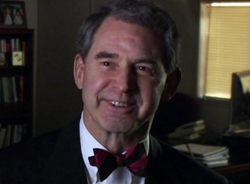
Jim Taylor is a father, grandfather and CEO of a large Louisville hospital. (Photo: Unnatural Causes)
SMITH: That’s right. One of the things we talk about in the film is the impact that stress has on the body, and especially unrelieved stress – what epidemiologists call chronic stress – has on the body. You have greater chances of heart disease, greater chances of diabetes and other kinds of problems.
[MUSIC AND SFX FROM ‘IN SICKNESS AND IN WEALTH’]
TURNER: I had a heart attack several years ago. It was mild, but it was still a heart attack. Thyroid problems, you know, and arthritis – you know, a little bit of everything.
GELLERMAN: You said a study of monkeys, where you show there’s physiological effect of stress, and hierarchy, and that the monkey that are on the lowest ladders, the lowest rungs in their society – have the poorest health – you actually have a cross-section of their arteries, in showing how the ones with least power have the most clogged arteries. So it has a physiological effect?
SMITH: Absolutely, yeah.
Carol Schively is the scholar who is a researcher who is working with primates, and one of the things she talks about is a metabolic disturbance, or a metabolic syndrome. And this is largely the effect that increased cortisol has on the body.
GELLERMAN: And cortisol is the stress hormone.
SMITH: Cortisol is a stress hormone – that we all have – and it’s usually higher in the day, and then later in the evening it sort of drops off. But if you’re under stress continually, it doesn’t drop off. And we see these in the primates that she’s studying, and we can see this in human beings as well.

Dr. Carol Shively has studied the correlation between stress and hierarchy in macaque monkeys. On the left is a cross section from the artery of a dominant animal. On the right is a cross section from the artery of a subordinate monkey that lives with the constant stress of low social standing. (Photo: Unnatural Causes)
ANDERSON: So, you know, whenever I walk in the store, nobody says, oh that’s Kim Anderson, African-American female lawyer, went to Columbia. They just see a black woman. I was at a store once, just walking around, thinking I was gonna buy a pair of jeans. This clerk’s following me around. So I said, ‘Why are you following me around? I’m not going to steal anything. Leave me alone. I am not going to take something.’
When you’re confronted with racism, that covert racism, your stomach just gets, like, so tight. You can feel it almost moving through your body, almost, you can feel it going into your bloodstream.
SMITH: The point there is not so much whether something happens, and it’s an occurrence of racism, but, do you have to be on guard? If you’re continually on guard about whether something, there’s going to be some sort of racist threat or racist attack – well, obviously, that’s stress, obviously your cortisol is up.
One of the things also, that we talk about in this film is that within this socioeconomic ladder, where you have better health at the top, and as you go down, health outcomes become worse and worse – if you’re an African American, wherever you are on that ladder, your health is going to be worse than your white counterpart. Even if I am wealthy as an African American, I am still not going to have as long a life, or as good health as someone who’s white, and making the same good money that I am making.
GELLERMAN: It seems to me that you’re not just trying to raise these points – you’re trying to, I don’t know, maybe, create a discussion, a dialogue?

Kim Anderson is a successful Atlanta lawyer. She says racism affects her physically.(Photo: Unnatural Causes)
GELLERMAN: Well, Llew, I want to thank you very much for coming in.
SMITH: Thank you.
GELLERMAN: Llewellyn Smith is co-executive producer, along with Larry Adelman, of the new PBS series, ‘Unnatural Causes: Is Inequality Making Us Sick?’ It debuts March 27th. Check your local listings for time and channel.
Related link:
Unnatural Causes: Is Inequality Making us Sick?
[MUSIC: Leningrad Symphony Orchestra “Gayane Ballet Suite” from 2001: A Space Odyssey Soundtrack” (Turner Entertainment 2005)]
Journey Beyond
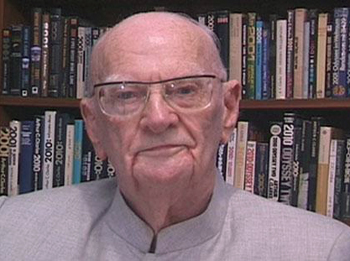
Arthur C. Clarke in a video greeting to NASA to mark the flyby of Cassini spacecraft last September. (Image: NASA)
GELLERMAN: It’s Living on Earth. I’m Bruce Gellerman.
Arthur Clarke was born in 1917 in the English seaside town of Minehead, a full 2 years before a landmark paper was published demonstrating space travel was physically possible. As a young boy Clarke fashioned a telescope out of a cardboard tube and a couple of lenses, which he focused on the distant heavens. And he’d spend a few pence on the American sci-fi pulp magazine, Astounding Stories of Super Science – where years later he published his first science fiction story. Over his prolific career, he authored more than a hundred books and countless short stories, about advanced science and the human condition.
He wrote, “Any sufficiently advanced technology is indistinguishable from magic.” And Arthur Clarke was most certainly a masterful magician, weaving stories of far-flung frontiers and near-distant futures.
He foresaw high orbiting telecom satellites decades before they rocketed into space. Today astronomers call their place 22 thousand miles above the Earth, a Clarke Orbit.
CLARKE: In my time I have been very fortunate to see many of my dreams come true.
GELLERMAN: Of course not all of Arthur Clarke’s predictions, dreams and imaginings came true. He boldly anticipated atomic powered rockets and cold fusion with the same certainty as geosynchronous satellites. And another of his favorite predictions has yet to be realized – the space elevator – tethering orbiting satellites to earth.
CLARKE: I’m always asked when do I think the space elevator will be built. And I always say about ten years after everyone stops laughing. Maybe 20 years. But I am pretty sure that the space elevator is an important element in future space travel.

Arthur C. Clarke in a video greeting to NASA to mark the flyby of Cassini spacecraft last September. (Image: NASA)
GELLERMAN: On March nineteenth, Arthur Clarke died, as he would say, “marking his 90th orbit of the sun.” On the very day he died, astronomers discovered the first inklings of life beyond our solar system. Using the orbiting Hubble telescope, they detected the organic molecule methane and water in the atmosphere of a distant planet. We suspect Sir Arthur Charles Clarke would have been delighted.
Related links:
- Arthur C. Clarke Foundation
- To hear IEEE Spectrum's full interview with Arthur C. Clarke, click here
- Research and discussion site for Arthur C. Clarke
[MUSIC: Berlin Philharmonic “Blue Danube Waltz” from 2001: A Space Odyssey (Turner Entertainment 2005)]
GELLERMAN: On the next Living on Earth – ferns usually play second fiddle in gardens. But in the nation’s premier place for native plants they take center stage:
UNIDENTIFIED MAN: You’d think that maybe in the Pacific Northwest where it rains all the time they’d have a lot of ferns but we have more ferns than just about anywhere else here. It’s a confluence of geology and climate and that sort of thing that really gives rise to the fern diversity that we have.
GELLERMAN: On the trail of ferns and mosses…coming up…next time on Living on Earth.
GELLERMAN: Living on Earth is produced by the World Media Foundation. Our crew includes Ashley Ahearn, Bobby Bascomb, Eileen Bolinsky, Ingrid Lobet, Helen Palmer, Mitra Taj and Jeff Young, with help from Jennifer Baessler, Sarah Calkins, and Alexandra Guttierrez. Our interns are Annie Jia and Margaret Rossano. Jeff Turton is our technical director. Alison Lirish Dean composed our themes. Steve Curwood is our executive producer.
The recordings of Arthur Clarke came to us courtesy of Spectrum Radio, the broadcast edition of IEEE Spectrum, the magazine of technology insiders.
You can find us at L-O-E dot org. I’m Bruce Gellerman. Thanks for listening.
ANNOUNCER: Funding for Living on Earth comes from the National Science Foundation, supporting coverage of emerging science, and Stonyfield Farm – organic yogurt and smoothies. Stonyfield pays its farmers not to use artificial growth hormones on their cows. Details at stonyfield.com. Support also comes from you our listeners, the Ford Foundation, the Town Creek Foundation, the Oak Foundation, supporting coverage of climate change and marine issues and Pax World Mutual Funds, socially and environmentally sustainable investing. Pax World – for tomorrow. On the web at paxworld.com.
ANNOUNCER2: PRI: Public Radio International
Living on Earth wants to hear from you!
Living on Earth
62 Calef Highway, Suite 212
Lee, NH 03861
Telephone: 617-287-4121
E-mail: comments@loe.org
Newsletter [Click here]
Donate to Living on Earth!
Living on Earth is an independent media program and relies entirely on contributions from listeners and institutions supporting public service. Please donate now to preserve an independent environmental voice.
NewsletterLiving on Earth offers a weekly delivery of the show's rundown to your mailbox. Sign up for our newsletter today!
 Sailors For The Sea: Be the change you want to sea.
Sailors For The Sea: Be the change you want to sea.
 The Grantham Foundation for the Protection of the Environment: Committed to protecting and improving the health of the global environment.
The Grantham Foundation for the Protection of the Environment: Committed to protecting and improving the health of the global environment.
 Contribute to Living on Earth and receive, as our gift to you, an archival print of one of Mark Seth Lender's extraordinary wildlife photographs. Follow the link to see Mark's current collection of photographs.
Contribute to Living on Earth and receive, as our gift to you, an archival print of one of Mark Seth Lender's extraordinary wildlife photographs. Follow the link to see Mark's current collection of photographs.
 Buy a signed copy of Mark Seth Lender's book Smeagull the Seagull & support Living on Earth
Buy a signed copy of Mark Seth Lender's book Smeagull the Seagull & support Living on Earth

